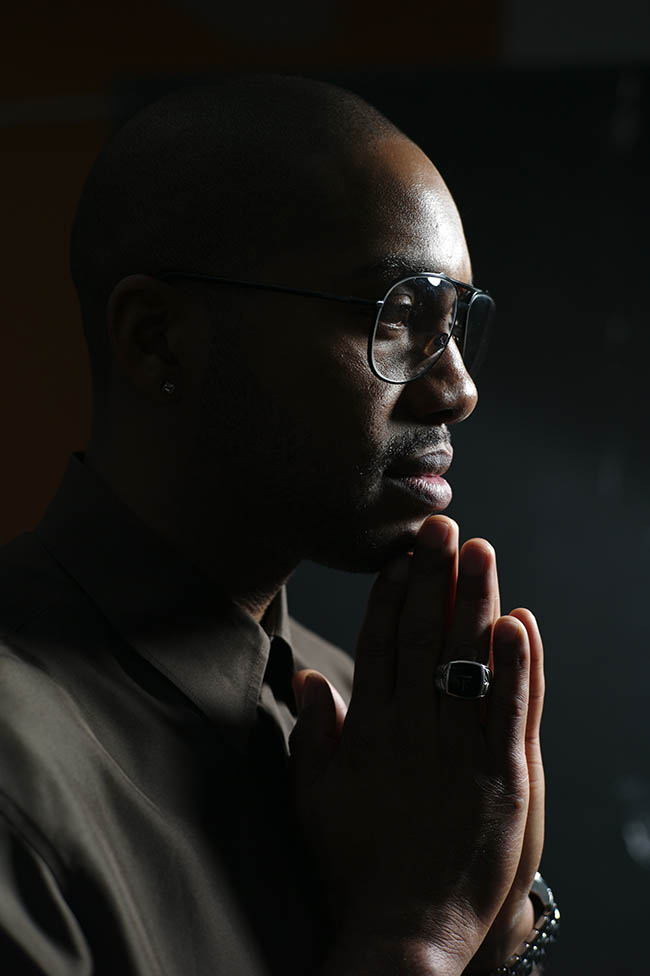Reinventing himself
A life of crime or productivity?
Guess which one Mitchell Jackson ’93 chose.
By Rhonda Morin
Mitchell S. Jackson ’93 had an attitude. He had the moves. He was going to be a professional basketball player. Yet, he never made it past the first season of his inaugural year playing for Clark College in 1993.
“I got benched after a poor play on the court early in the season. Then I was late for practice and had to do a drill called Penguin Pride. I didn’t do the drill, so I was kicked off the team,” said Jackson.

Author and professor Mitchell S. Jackson ’93. Photo by John Ricard
Dave Waldow, head coach at the time, would repeatedly roll the ball down court and make players run, pick up the ball and make 20 lay-ups. The count would be adjusted when they missed a shot or if the ball hit the wall. It was a challenging drill, but it taught players discipline. During one practice, Jackson simply wasn’t willing to participate.
“I told him there’s the door if he didn’t run,” said Waldow. “I felt bad when dismissed. He was a good kid. But if players don’t follow the rules, then I have chaos.”
Jackson temporarily shelved his basketball ambitions, but stuck to his studies at Clark for the rest of the academic year, managing a C grade in one course—English—that would ultimately play a major part in his career. Jackson transferred to Portland Community College the next year, picked up the ball again to compete and went on to get degrees at other institutions in the Northwest and Northeast.
Today, he’s a professor and awarding-winner author of the autobiographical novel “The Residue Years.” He’s also in the first round of edits for a new book, “Survival Math.”
Jackson’s path has been anything but ordinary. His mother struggled with addiction that resulted in absences from his life during Jackson’s formative years. He took to selling crack and powder cocaine to support himself and his family when he was a teenager and as a college student. During his junior year at Portland State University, the part-time gig landed him in Santiam Correctional Institute in Salem, Ore., for 16 months. He was released in 1998, committing to never returning as an inmate—a promise to himself he has kept.
Some of his family members are in prison and gangs. These influences and growing up in North and Northeast Portland in the late 1980s and early 1990s, profoundly affected Jackson and provided him with a deep creative pool to dip into for his later work.
Today, he reflects on his choices, missteps, reinvention and promise for his future. He considers the destiny of young people when he takes to the stage as a national speaker. In February, Jackson was in Dallas speaking at a Jewish youth group conference, B’nai B’rith Youth Organization (BBYO), now BBYO Inc. Later this year he has presentations at Columbia University and Sarah Lawrence College.
When not on the road, he’s teaching creative nonfiction writing at New York University, as well as serving as an adjunct at Columbia University. His first nonfiction book, “Survival Math” is due to be published in the summer of 2018.
The book is about making immediate decisions in order to survive, something that Jackson and his family have experienced first-hand.
“I am telling it through stories of how my family and close friends have lived,” he said. “There was an essay in “Salon” written by me about this (March 17, 2014). About a time when a guy in high school pulled a gun and threatened to kill me. I had to make on-the-spot calculations for him not to shoot me.”
One of the constructive tenets of Jackson’s path has been education. Learning about how to create memorable voice and exploring quality storytelling has been his life vest during threatening times.
“Had I not been in school, there would not have been anything to hold me back from becoming a full-fledged deviant. Being at Clark kept me feeling positive about myself when I really needed it,” said Jackson.
He shares that message when he speaks as he did when he visited Clark on a snowy day in January 2017.
He is also forthcoming about the realities of being a writer. It took him 15 years to write his first novel, and it was nearly a year and a half after “The Residue Years” was published before he received financial return for his labor.
“Perseverance is what you need to make it. If you’re trying to be a writer and want to be an overnight success, you picked the wrong profession,” said Jackson. “Clarify your motivations and what you’re willing to give to it before you (expect to) see results.”
|
Have you written a book or publish regularly in a blog? Share your story on our Facebook page. |
03/31/2017



